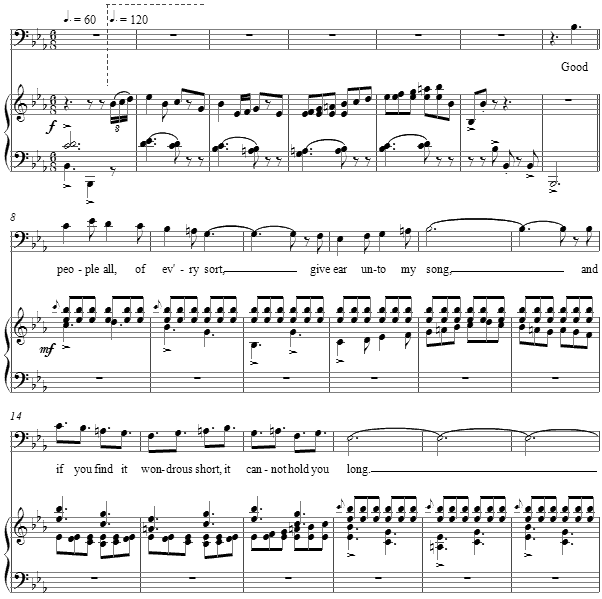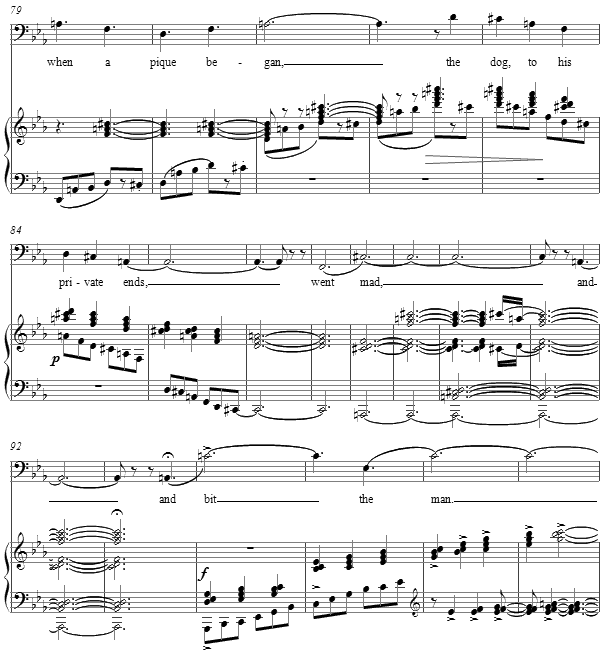Music and Texts of GARY BACHLUND
Vocal Music | Piano | Organ | Chamber Music | Orchestral | Articles and Commentary | Poems and Stories | Miscellany | FAQs
An Elegy on the Death of a Mad Dog - (2007)
Oliver Goldsmith
for bass baritone and piano
for Krzysztof Borysiewicz
Good people all, of every sort,
Give ear unto my song,
And if you find it wondrous short,
It cannot hold you long.
In Islington there was a man,
Of whom the world might say,
That still a godly race he ran,
Whene'er he went to pray.
A kind and gentle heart he had,
To comfort friends and foes;
The naked every day he clad,
When he put on his clothes.
And in that town a dog was found,
As many dogs there be,
Both mongrel, puppy, whelp, and hound,
And curs of low degree.
This dog and man at first were friends;
But when a pique began,
The dog, to gain his private ends,
Went mad, and bit the man.
Around from all the neighboring streets
The wond'ring neighbors ran,
And swore the dog had lost his wits,
To bite so good a man.
The wound it seem'd both sore and sad
To every Christian eye;
And while they swore the dog was mad,
They swore the man would die.
But soon a wonder came to light,
That show'd the rogues they lied:
The man recover'd of the bite --
The dog it was that died.[ 7 pages, circa 3' 30" ]
Oliver Goldsmith
Oliver Goldsmith (1730-1774) was an Irish writer, poet, and physician known for his novel The Vicar of Wakefield (1766), his pastoral poem The Deserted Village (1770) (written in memory of his brother), and his plays The Good-natur'd Man (1768) and She Stoops to Conquer (1771, first performed in 1773). He is also thought to have written the classic children's tale, The History of Little Goody Two Shoes, giving the world that familiar phrase.
Goldsmith earned his Bachelor of Arts in 1749 at Trinity College, Dublin, and studied theology and law but never got as far as ordination.
He later studied medicine at the University of Edinburgh and the University of Leiden, then toured Europe, while not following any of the aforementioned careers. He also studied at the University of Padua in 1755 and 1757. On his return, he settled in London, where he worked as an apothecary's assistant. Perennially in debt and addicted to gambling, Goldsmith had a massive output as a hack writer for the publishers of London, but his few painstaking works earned him the company of Samuel Johnson, along with whom he was a founding member of "The Club". The combination of his literary work and his dissolute lifestyle led Horace Walpole to giving him the much quoted epithet of "Inspired Idiot." Perhaps, but such an "idiot" is well remembered and well performed.
Set for bass baritone, this light-hearted setting of Goldsmith's wonderful story moves between a buoyant E flat major and its darker neighbor, D minor. Goldsmith's text reminds us that, as with many simple lessons of life, this "wondrous story" of his "cannot hold you long." And so the storytelling as underscored by a musical setting is short and to the point.
As the tale might hint that it was the dog which was "poisoned" by biting the man, rather than the more expected opposite, a foreshortened reference to Schubert's beloved setting of the Ave Maria text, that we might think the man pious -- when in church. What might we think of him when he was not at prayer? Did the dog in fact bite him out of having been mistreated?
The scalar insistence on the tonality of E flat serves to make a clear distinction between this tale of a man, and the situation of the "mad dog." The shift to D minor, a simple slipping down of the half-step serves this function, while the gestural story-telling device continues its thematic tale under a rhythmic shift in the accompaniment.
This setting was written for bass-baritone Krzysztof Borsiewicz, who I came to know during our rehearsals for Wagner's Der fliegende Holländer. Borsiewicz was born in Warsaw, and his first musical training was as a clarinetist. He began voice studies at the Warsaw Music Academy, and was guest in many of the theater in Poland. In 1994, he was a prize winner in the Didur Competition in Bytom, and in 1996 he won the 33rd International Francisco Vinas Competition in Barcelona as well as the 4th place in the Lauritz Melchior Competition in Kopenhagen. Following this, in 1998 he took 2nd Prize in the International Vocal Competition "Rocca delle Macie" in Tuscany, followed in 2000 by the 3rd Prize in the "Amber Sea" Voices-Riga. He has performed at Teatro Tivoli, Teatro Regio di Parma, the Königsoper in Copenhagen, and the Thüringer Landestheater. Since the 2003-2004 season he has been in the ensemble of the Landestheater Salzburg, as well as a guest at Theater Aachen.
The score for An Elegy on the Death of a Mad Dog in the low key is available as a free PDF download, though any major commercial performance or recording of the work is prohibited without prior arrangement with the composer. Click on the graphic below for this piano-vocal score.
Elegy on the Death of a Mad Dog



